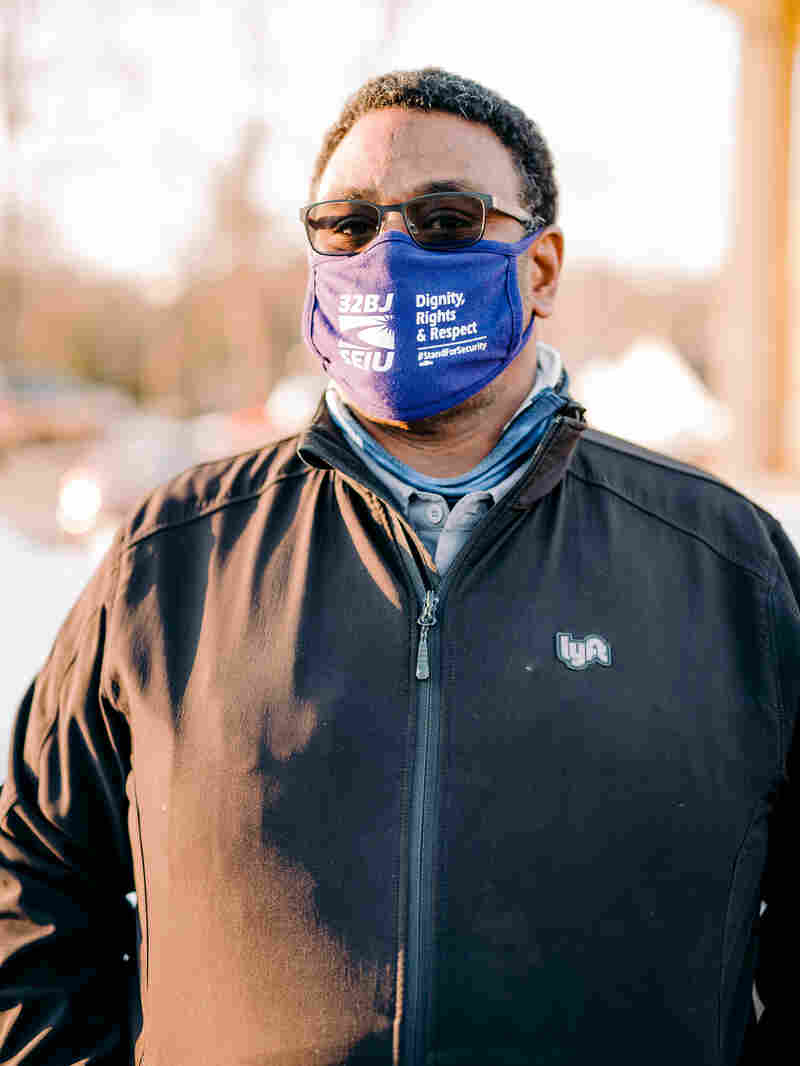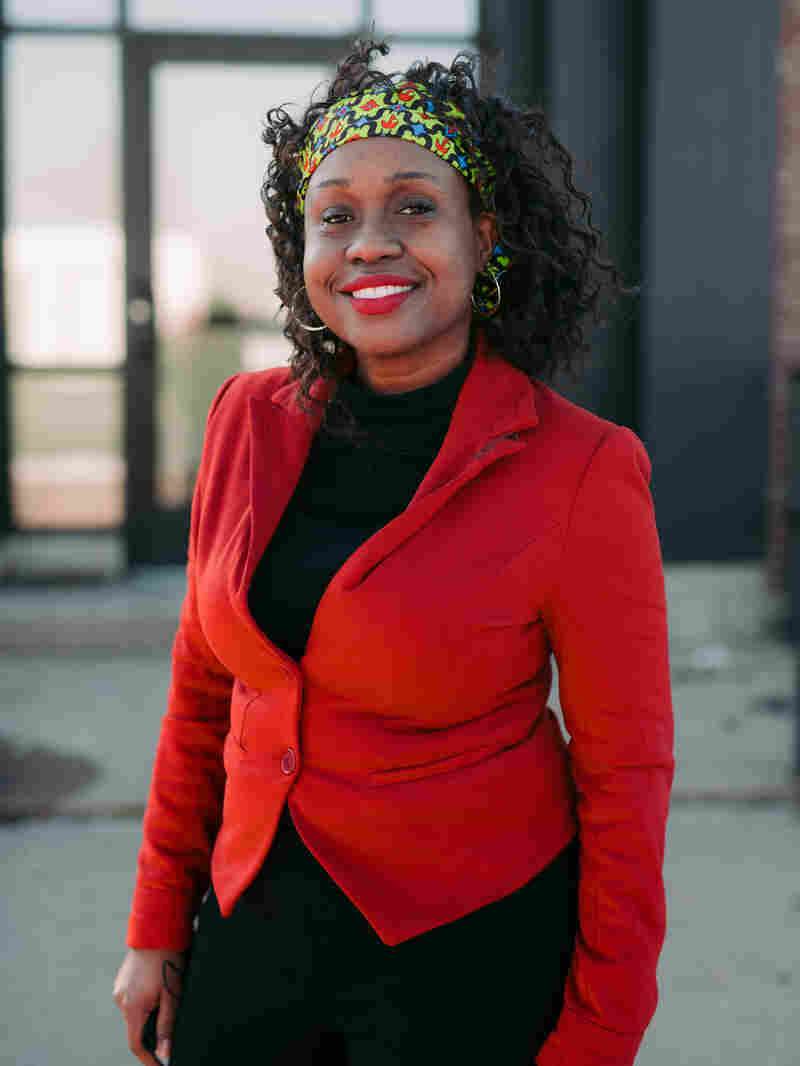
Trinity Health RN Kayla Bennett gives Hartford, Conn., resident James Watts his first dose of the COVID-19 vaccine at a neighborhood vaccine clinic at the at the Parker Memorial Community Center.
Ryan Caron King/Connecticut Public
hide caption
toggle caption
Ryan Caron King/Connecticut Public

Trinity Health RN Kayla Bennett gives Hartford, Conn., resident James Watts his first dose of the COVID-19 vaccine at a neighborhood vaccine clinic at the at the Parker Memorial Community Center.
Ryan Caron King/Connecticut Public
A number of states are breaking with federal guidelines and starting to vaccinate people by age group, drawing criticism from essential workers and people with underlying conditions who are getting bumped back in line.
In Connecticut, officials say they’re trying to balance equity with speeding up the pace of vaccinations. Under a new vaccination plan that began on March 1, educators are still prioritized but essential workers like grocers, security officers and janitors, who would have been next in line, now have to wait until their age group comes up.
“I am very excited honestly,” said Missy Giandurco, 41, who teaches eighth-grade special education. “It’s been a very stressful year and the governor made the right choice by moving it forward a little faster.”
Someone who’s not excited is DeShawn Brownell. His job as a security guard doesn’t allow him to social distance. Under the previous plan he would have been in the next group to be vaccinated but he’s 46-years-old and he’ll have to wait.
“I’m disappointed. I’m a little bit younger, but at the same time, I have epilepsy. I have high blood pressure,” said Brownell. “What if something happens to me? I’m the one with the main income. It would affect my kids, wife, and my outside family, like my mom, my dad. It’s like a domino effect.”
Three other states have also adopted age-based prioritizations, as they transition to subsequent phases of their vaccine rollouts. In Maine, people 60 and older have been able to register for a vaccine since March 3. Rhode Island is moving to an age-based system but still prioritizing people with underlying medical conditions between 16 and 64 years of age. And beginning March 8, Vermont will allow people 55 and older with specific high-risk health conditions to register, and extend eligibility a week later to people 16 and older with certain medical conditions.

DeShawn Brownell, a security officer and SEIU 32 BJ union member.
Tony Spinelli/Connecticut Public Radio
hide caption
toggle caption
Tony Spinelli/Connecticut Public Radio

DeShawn Brownell, a security officer and SEIU 32 BJ union member.
Tony Spinelli/Connecticut Public Radio
Under Connecticut’s new rollout plan, comorbidities or medical conditions like Brownell has will not be determining factors for eligibility. Brownell is a member of SEIU 32BJ, a union that represents doormen, janitors and other property service workers who are predominantly Black and brown and has lost seven members in Connecticut to COVID-19.
“We are disappointed and shocked,” said the union’s vice-president Rochelle Palache, 41.
“Our members are deemed essential, but the way they’ve been treated and the resources that they’ve been offered just does not match up,” she added. “If they’re essential, they should be prioritized for vaccination.”
Essential workers and those with high-risk medical conditions comprise a third of Connecticut’s population. And the guidelines set by the Centers for Disease Control and Prevention that Connecticut dropped are meant to relieve the burden of the pandemic on them.
But state data indicate age is one of the strongest factors contributing to COVID-19 morbidity: 96% of all deaths caused by the pandemic in Connecticut are of people 55 and older. And state officials expect the quicker rollout enabled by the new age-based plan will ensure that vaccines reach those hard-hit communities.

Rochelle Palache, vice president of SEIU 32 BJ. Her union has lost seven members to COVID-19 in Connecticut.
Tony Spinelli/Connecticut Public Radio
hide caption
toggle caption
Tony Spinelli/Connecticut Public Radio

Rochelle Palache, vice president of SEIU 32 BJ. Her union has lost seven members to COVID-19 in Connecticut.
Tony Spinelli/Connecticut Public Radio
Josh Geballe, the Chief Operating Officer of Gov. Ned Lamont’s administration, argues that the need to verify membership of essential groups slows efforts to deliver vaccines quickly and fairly.
“Making sure we get everyone in there, regardless of what industry they’re in, regardless of what medical condition they may have, regardless of whether they’re employed or unemployed, or whether they have good access to health care or not — is going to help us get the most equitable outcome the most quickly,” Geballe said.
Critics say the new age-based system discriminates against younger people with disabilities and underlying medical conditions. The non-profit organization Disability Rights Connecticut has filed a complaint with the U.S. Office for Civil Rights over the state’s new age-based vaccine policy. The complaint calls on the state to prioritize at-risk people in younger age brackets.
Greg Gonsalves, a professor of epidemiology at Yale University, says the state’s new distribution system doesn’t ensure equity.
“If you have access to resources, you’re computer literate and you have some savvy in working your way through the system to sign up for vaccines – you’re going to be first in line no matter what age class you’re in,” said Gonsalves.
According to Gonsalves, an age-based rollout also disregards existing racial disparities in health.
“The risk of death for somebody who is African-American and between 55 and 65 may be higher than somebody who’s over 65, for instance,” he said.
